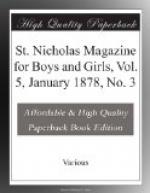Thorny forgot both sulks and shyness after that, and suddenly began to talk. Ben was flattered by his interest in the dear dog, and opened out so delightfully that he soon charmed the other by his lively tales of circus-life. Then Miss Celia felt relieved, and everything went splendidly, especially the food, for the plates were emptied several times, the little tea-pot ran dry twice, and the hostess was just wondering if she ought to stop her voracious guests, when something occurred which spared her that painful task.
A small boy was suddenly discovered standing in the path behind them, regarding the company with an air of solemn interest. A pretty, well dressed child of six, with dark hair cut short across the brow, a rosy face, a stout pair of legs, left bare by the socks which had slipped down over the dusty little shoes. One end of a wide sash trailed behind him, a straw hat hung at his back, while his right hand firmly grasped a small turtle, and his left a choice collection of sticks. Before Miss Celia could speak, the stranger calmly announced his mission.
“I have come to see the peacocks.”
“You shall presently—” began Miss Celia, but got no further, for the child added, coming a step nearer:
“And the wabbits.”
“Yes, but first wont you—”
“And the curly dog,” continued the small voice, as another step brought the resolute young personage nearer.
“There he is.”
A pause, a long look, then a new demand with the same solemn tone, the same advance.
“I wish to hear the donkey bray.”
“Certainly, if he will.”
“And the peacocks scream.”
“Anything more, sir?”
Having reached the table by this time, the insatiable infant surveyed its ravaged surface, then pointed a fat little finger at the last cake, left for manners, and said, commandingly;
“I will have some of that.”
“Help yourself; and sit upon the step to eat it, while you tell me whose boy you are,” said Miss Celia, much amused at his proceedings.
Deliberately putting down his sticks, the child took the cake, and, composing himself upon the step, answered with his rosy mouth full:
“I am papa’s boy. He makes a paper. I help him a great deal.”
“What is his name?”
“Mr. Barlow. We live in Springfield,” volunteered the new guest, unbending a trifle, thanks to the charms of the cake.
“Have you a mamma, dear?”
“She takes naps. I go to walk then.”
“Without leave, I suspect. Have you no brothers or sisters to go with you?” asked Miss Celia, wondering where the little runaway belonged.
“I have two brothers, Thomas Merton Barlow and Harry Sanford Barlow. I am Alfred Tennyson Barlow. We don’t have any girls in our house, only Bridget.”
“Don’t you go to school?”
“The boys do. I don’t learn any Greeks and Latins yet. I dig, and read to mamma, and make poetrys for her.”




